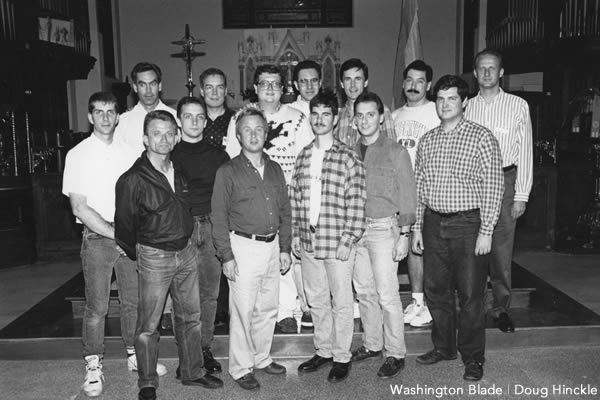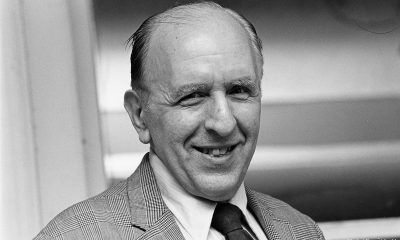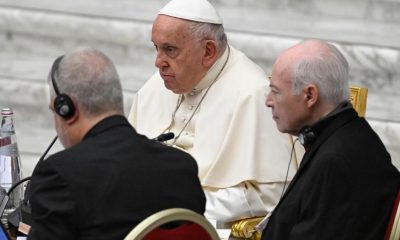Arts & Entertainment
Faith of our fathers
40-year-old gay Catholic group defies Vatican yet seeks communion
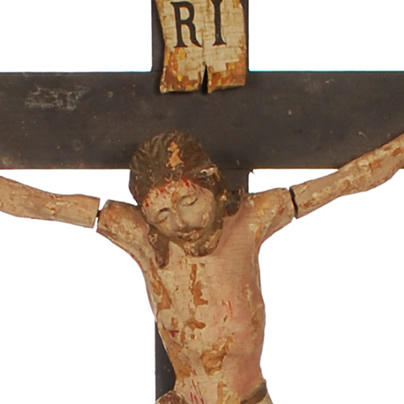
All the mainline Christian denominations by now have gay subgroups that have formed and many in the U.S. — Episcopalians, United Methodists and others — can point to huge strides they’ve made over the last several decades in persuading their hierarchies to acknowledge their presence.
Dignity/Washington, the largest chapter of the LGBT Roman Catholic group DignityUSA, has made so little progress making Vatican teaching less gay-condemning, the group, in many ways, has moved on to other goals it considers more realistic and achievable. The lone victories its members can count on that front are being invited indoors for a 1978 rainstorm during a weekend-long prayer vigil they held at the National Conference of Catholic Bishops at its former headquarters on Massachusetts Avenue (it didn’t foster a long-term dialogue) and a wave from current Pope Benedict XVI (Joseph Ratzinger) in the summer of 2010 (accompanying soon-to-be Cardinal Donald Wuerl did not follow suit).
If anything, the Vatican has become more anti-gay over the years. Though several regional parishes had long allowed Dignity groups to meet on their property, in 1986 Ratzinger, writing as the Vatican’s official keeper of church morality, issued a letter stating that gays and lesbians are “intrinsically disordered” and that gay organizations were no longer allowed the use of church property. It’s only gotten worse in recent years — in January, Pope Benedict condemned same-sex marriage efforts and called gay marriage, in an ironic choice of words, a threat “to human dignity and the future of humanity itself … pride of place goes to the family based on the marriage of a man and woman.”
And it wasn’t just talk — the Roman Catholic Church gave $2 million this year to unsuccessful efforts to outlaw same-sex marriage with November’s ballot initiatives in Maine, Maryland, Minnesota and Washington state, according to the Human Rights Campaign. As pro-LGBT efforts of any kind have taken root elsewhere, the Vatican has increasingly dug in its heels. Official church teaching is that although gays should “be accepted with respect, compassion and sensitivity,” “homosexual acts are intrinsically disordered” and “sexual activity only exists for the purpose of procreation.”
DignityUSA, however, has persevered. The Washington chapter, formed in the fall of 1972 (three years after the national group) and one of 45 active U.S. chapters, has its 40th anniversary events (“Forty and Fabulous on the First”) this weekend. On Saturday evening, a reception and dinner will be held at Clyde’s Restaurant (707 7th St., N.W.) with gay actor/singer Will Gartshore providing entertainment. On Sunday, Sr. Jeannine Gramick (Sisters of Loretto) will give the homily at a special “anniversary Mass.” The group meets weekly for a 6 p.m. Mass at St. Margaret’s Church, an Episcopal parish at 1820 Connecticut Ave., N.W. Details are at dignitywashington.org.
The sheer numbers are daunting. The Roman Catholic Church is the world’s largest Christian church with more than a billion members worldwide. It claims it is the one true church founded by Jesus Christ, that its bishops are the successors of Christ’s apostles and Pope Benedict is the successor to the biblical figure Peter. Though there was no recognized papacy until later centuries, Rome has named an unbroken line of bishops that dates to Peter and the first century. The Archdiocese of Washington did not respond to a request for comment for this article. Dignity/Washington members say relations with it are prickly at best.
“There’s no sense that the local archdiocese has evolved at all,” says Tom Bower, a gay member for almost the whole time the D.C. group has existed, a board member for eight years and co-chair for the anniversary committee. “They absolutely find us quite beyond the pale.”
DignityUSA, a U.S. group as its name implies (similar but unaffiliated gay Catholic groups exist in other countries), has about 6,000 dues-paying members, according to Executive Director Marianne Duddy-Burke, a lesbian, and an operating budget at the national level of about $550,000 though the chapters have their own budgets.
It’s a big weekend for the organization — the Boston chapter is also celebrating its 40th anniversary. San Diego, Chicago and New York also formed chapters in 1972. Dignity/Washington started with a group of about 20 at its first Mass. It moved from twice-monthly to weekly Mass in 1976. Membership and Mass attendance peaked at about 500 and 350 respectively in the late ‘80s. By late 1990, it had become the largest Dignity chapter in the U.S., a feat it maintains to this day, though membership is now about 200 with an average of 90-100 believers attending weekly Dignity Mass in D.C.
It owns its own building in Eastern Market that houses offices and provides space to other LGBT organizations such as Brother Help Thyself and Imperial Court. As with most Dignity chapters, Dignity/Washington prefers to let other churches host its services rather than build its own sanctuary.
“Most of our chapters are kind of hand to mouth,” Duddy-Burke says. “We pay our rent and our basic expenses, we have the weekly bulletins and we underwrite memberships for low-income people and most of our chapters give back to their own communities in some way. … Our model really isn’t based on the institutional model. We focus on the church as more of a community than a building.”
Despite the daunting odds, the group is celebrating. Bower says the group’s mere survival is a reason to be ecstatic.
“The official church would very much like us to disappear,” he says. “We show that you can be gay and Catholic at the same time and happily so and despite the major efforts of a much bigger organization to throw us out. We’re part of a national organization and when the Pope comes out against something gay, we’re able to say, ‘No, that’s wrong.’”
Bob Miailovich, a member for 35 years — someone left a Dignity brochure on his car while he was in a gay bar — agrees.
“This small group of gay men got together back in the early ‘70s — who would have ever envisioned this thing being as big as it is and the ongoing evolution of this group. I mean we’re a small group of sort of churchy guys, but it’s really opened up and I think we’re more broadly attuned to the world at this time and to what faith is all about.”
Despite the political and spiritual cold shoulder, DignityUSA wants to be recognized by the Holy See, the Roman Catholic Church’s central governing body. It’s a key component to the organization’s mission. While many LGBT Christian groups, Catholic and otherwise, have started their own denominations with no interest whatsoever in swaying the Vatican, Dignity, at its very core, feels that it’s important to stay within the church and fight as much as possible. Though many gay Christians cannot fathom wanting anything to do with the Roman Catholic Church after centuries of anti-gay teaching, Dignity members say it’s essential.
“People think, ‘Oh, why do you keep banging your head against the wall?’” Bower says. “That’s why we call it faith. It’s a belief that there is within the larger view of what it means to be Catholic, there’s something there that you just don’t have with other groups.”
Miailovich says despite the anti-gay teachings, he still “find(s) more truth in the Catholic Church than I do in other religions. It’s not perfect and I don’t buy everything at the end of the day but from what I know of other religions and what they teach and believe, I find more truth on the Catholic side than elsewhere else.”
As one might expect considering its size, millions have left the Catholic Church for all kinds of reasons and to varying degrees. Hard though it may be for LGBT people to fathom, there are even strains of Catholicism that have broken off from Rome because they feel the Vatican has gotten too liberal.
The most notorious is the Mexico City-based New Jerusalem, a gated community of about 3,000 that was founded in 1973 as a reaction to the Second Vatican Council of 1962-1965, a hugely influential change in Church teaching that allowed Masses to be said in languages besides Latin among many other things. Several “Traditionalist Catholic” splinter groups also revolted against Vatican II reform, but New Jerusalem is widely regarded as the most extreme — TV, radios, alcohol, makeup and pants for women are forbidden. Residents attend church three times daily, don’t recognize any post-Vatican II Roman church leaders and think Benedict is the anti-Christ. Fundamentalist splinter groups occur in other religions as well — the Fundamentalist Church of Jesus Christ of Latter-day Saints received massive media attention in recent years when its leader was convicted of two felony counts of child sexual assault.
Other groups have broken away on the opposite side of the theological spectrum. The North American Old Catholic Church considers itself a “2,000-year-old church with Apostolic succession” and teaches the “full inclusion of LGBT persons in our religious life, sacraments and clergy.” It also advocates for “the full inclusion of LGBT persons throughout society.” Two gay-welcoming Old Catholic churches were launched in Washington — one in 2011 and another this year— but appear to be inactive. Neither Presiding Bishop Rev. Michael Seneco, who’s gay, nor Rev. Kerolos Saleib of Saint Damien of Molokai Parish responded to multiple requests for comment or had recently updated websites. The churches that hosted them say they’re no longer meeting there. Salieb held a series of Masses at National City Christian Church during the International AIDS Conference this summer but fled the country soon after under mysterious circumstances. Duddy-Burke says many similar groups have come and gone over the years.
Denomination hopping between Episcopalians and Catholics, perhaps the two most stylistically similar denominations in the U.S., has been going on for all kinds of reasons for decades. Many progressive believers left the Catholic Church to find more gay- and women-friendly theology among Episcopalians, the Anglican Church in the U.S. The Catholic Church in recent years has started welcoming a spate of disenfranchised former Episcopalians who left disappointed that the church had become more gay-friendly. Others Episcopalians still, as has been widely reported, left their U.S. dioceses to align with more conservative Anglicans in other countries.
Bower says for him, converting to the Episcopal faith is not feasible.
“There are some basic theological differences between Catholicism and Episcopalianism,” he says. “Even in something as basic as Communion and the notion of transubstantiation. We really believe there is a change in the body and blood. They see it more as a memorial. And there’s a whole historical precedent of difference between the Roman and English churches.”
Others are pushing as far as they can under Vatican leadership and not just on LGBT issues. A lengthy article in the current edition of Rolling Stone magazine tells the stories of Sister Simone Campbell, Sister Margaret Farley and others who are “refusing to back down from the Catholic Church itself up to and including the Pope. On issues ranging from gay rights to abortion, the nuns are either openly contradicting church dogma or quietly undermining it with their silence, choosing instead to embrace a radical notion of missionary work that wouldn’t be out of place at an Occupy Wall Street rally: income inequality, universal health care, corporate responsibility, immigration reform,” and elsewhere reproductive rights. A group called Roman Catholic Womenpriests includes former nuns, ordains women as priests and holds women-led Masses.
Campbell, who didn’t immediately respond to a Blade interview request, told Rolling Stone, the same anti-LGBT beliefs are equally as harmful to women in the exclusively male-led Vatican.
“You’ve got to realize that any crowd that took 350 years to figure out Galileo might be right is not noted for rapid change,” she told Rolling Stone. “This is about a cultural clash between monarchy, in which the monarch is always right, and democracy where everybody has equal dignity, responsibility and opportunity, women and men. The whole idea that we live in a pluralistic society is news to these guys.”
The combined effect of all this shifting is a diminished Vatican hurt by a range of factors, from those turned off by its increasingly right-leaning teachings to millions lost and incalculable damage incurred by the clergy abuse scandals of recent years. Benedict, at times, has seemed almost cavalier about the loss, advocating for a “smaller, purer” church and saying that a church that seeks “above all to be attractive is already on the wrong path.”
Regardless of one’s political or religious views, the numbers are surprising — a third of those reared Catholic in the U.S. leave the church and, according to a Pew Research Study, 10 percent of all Americans are former Catholics. The losses have been partially offset by the disproportionately high number of immigrants who are Catholic.
Gramick, in a lengthy phone interview this week from her home in Mt. Ranier, Md., says the Roman Catholic “institution is unraveling.” Gramick, who declines to give her sexual orientation, was present at the first meeting to form Dignity/Washington in the cafeteria of the National Shrine of the Immaculate Conception with five others in 1971. She later formed New Ways Ministry, which she calls “a peace and justice center focused solely on the issue of lesbian and gay rights.”
Of the Church’s continual anti-gay teaching, she says it’s “causing a lot of dissonance and alienation among the Catholic community and a lot of Catholics out there in the pews, they’re no longer in the pews. Mass attendance has decreased dramatically in the last 20-30 years and actually what I think we’re seeing is the beginning of the dissolution of the institutional church. The institution is unraveling but the faith of the people is continuing and growing.”
Is it conceivable to imagine a post-Vatican world in another generation or two?
“If you’re talking erasure, I don’t think I’d go that far, but it’s unraveling certainly … it’s getting increasingly frayed and not only at the edges. It’s really closer to the center and it’s coming apart at the seams.”
Dignity Catholics don’t want that. At the most basic level, they believe the Vatican is simply wrong on the traditional view of Christian teaching and homosexuality, though opinions vary as to the reasons.
“We say basically go back and look at the theological arguments presented and they’re false,” Bower says. “We’re not picking and choosing which teachings to abide by. This is what you get when you look at the gospels. There really are no statements about LGBT people the way we think of it today. The type of homosexuality they were referring to was basically idol worship and temple prostitution.”
Having worked on these issues for decades, Gramick says the Vatican’s gay and lesbian theology is “not really based on the Bible.”
“It’s really more based on philosophy and natural law that uses scriptural quotes as backup,” she says. “It doesn’t really use scripture as the basis for its objection. They say homosexuality is unnatural without any acknowledgement that nature changes. What you see with the Vatican is an unwillingness to acknowledge change. If you have a 13th century mind, you would understand their position but with a 21st century mind and the science we’ve discovered, the human person is not what the Vatican thinks a person is. … Psychology has come so far since then. They didn’t know anything about Freud. When they come out with these views of it being a disorder, this is just not an enlightened view of psychology.”
Gramick’s iconoclastic work has not gone unnoticed — she says in the last 11 years, her religious community has received nine letters from the Vatican advising her superiors to have her dismissed from the Sisters of Loretto. The three presidents in that time have backed her, though the Church does play hardball — last month Rev. Roy Bourgeois was “canonically dismissed” for ordaining a woman at a Unitarian church in Kentucky in 2008.
Duddy-Burke says the decades of Vatican opposition have brought both a change of approach from DignityUSA and unexpected advantages.
“I think we’ve actually moved from trying to get acceptance from the Vatican to really leading the rest of the Church into being a more just Church,” she says. “I think we sort of feel like our job now is to hold our leadership accountable for the damage they’ve done and at the same time model a better way of living out the Gospel.”
She says slowly this approach has “caused people to see that the Church not only belongs to the Bishop and the Vatican. All of us who are baptized Catholics own the Church as well as the rites that are part of it. … If people ever caught on it would be like, ‘Wow, you’re governing it, you’re saying who preaches and presides, you decide if you want to use the new Roman Missel or not.’ Because we’ve been so excluded, we’ve had this opportunity to create the Church that we deserve and it’s an opportunity that a lot of Catholics haven’t had.”
Despite the Vatican’s refusal to bend, there’s growing evidence, both anecdotally and in serious research, that its official teachings are out of step with the majority of its laity — a summer poll conducted by the Pew Forum on Religion and Public Life found that 58 percent of Catholics favor same-sex marriage with 33 percent opposed. On matters as far-ranging as whether an unexcused absence from weekly Mass warrants a mortal sin to use of contraception, U.S. Catholics and many of their counterparts in other countries have long been a body of believers who haven’t felt they had to adhere to all church doctrine to stay in the church. Many parishes and clergy — even some who perform Dignity Masses — are quietly gay welcoming. They keep it low key to avoid interference from church leaders, but can sometimes be more welcoming than many would realize. So much so, in some cases, that it’s eaten into Dignity’s roster.
That’s partially why Dignity members say they don’t want to leave the church.
“The church really is the people of God,” Miailovich says. “It’s a horizontal assembly, not some vertical thing where you have the Pope at the top and an triangle going down with everyone else. Out there in the pews, there’s a great deal of support for a more progressive agenda, for women’s ordination, for married priests, you have the nuns on the bus for social justice. Everybody in the church does not believe 100 percent of everything that may be promulgated from on high.”
He also says there’s an “attitude that it’s my church and you can’t take it away from me.”
“I can’t leave what is mine and that leaves you with a sense that some day, somehow, change will be made. You’re right, there are people who’ve said, ‘Why spend a lifetime working with these people, let’s go start our own thing and not worry about what’s left behind.’ But I’m not going to change. This is who I am. This is how I pray and how I worship and here I am. We pray for our church leaders because we feel they need enlightenment.”
Bower agrees.
“We’ve found a peace and reconciliation within ourselves,” he says. “It’s more like a ‘We think we’re right and we’re here if you ever want to talk’-kind of thing. There’s less time today spent trying to articulate and debate all these issues because there’s really nobody to talk to on the other side.”
Despite, the ongoing dissent, Gramick says the occasion is a celebration.
“They’ve had a marvelous ministry here for 40 years ministering to local LGBT Catholics,” she says. “It’s really a time to rejoice.”
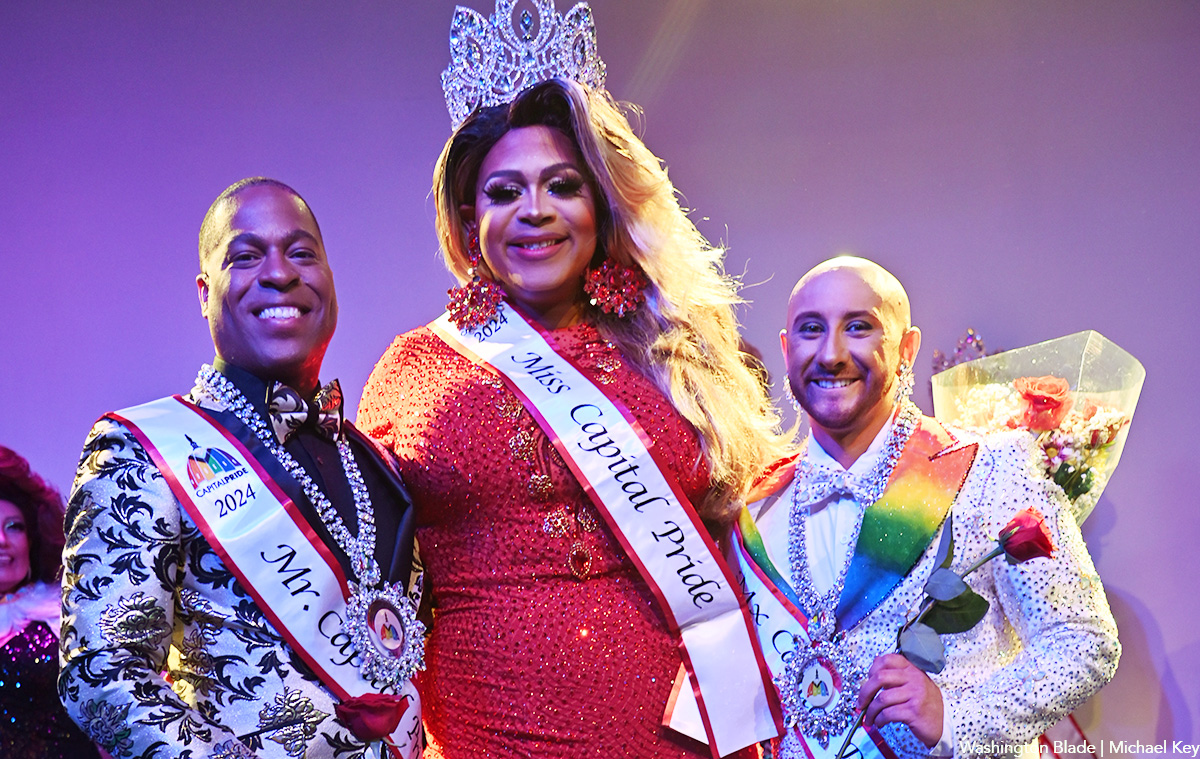
Eight contestants vied for Mr., Miss and Mx. Capital Pride 2024 at a pageant at Penn Social on Saturday. Xander Childs Valentino was crowned Mr. Capital Pride, Dylan B. Dickherson White was crowned Mx. Capital Pride and Sasha Adams Sanchez was crowned Miss Capital Pride.
(Washington Blade photos by Michael Key)
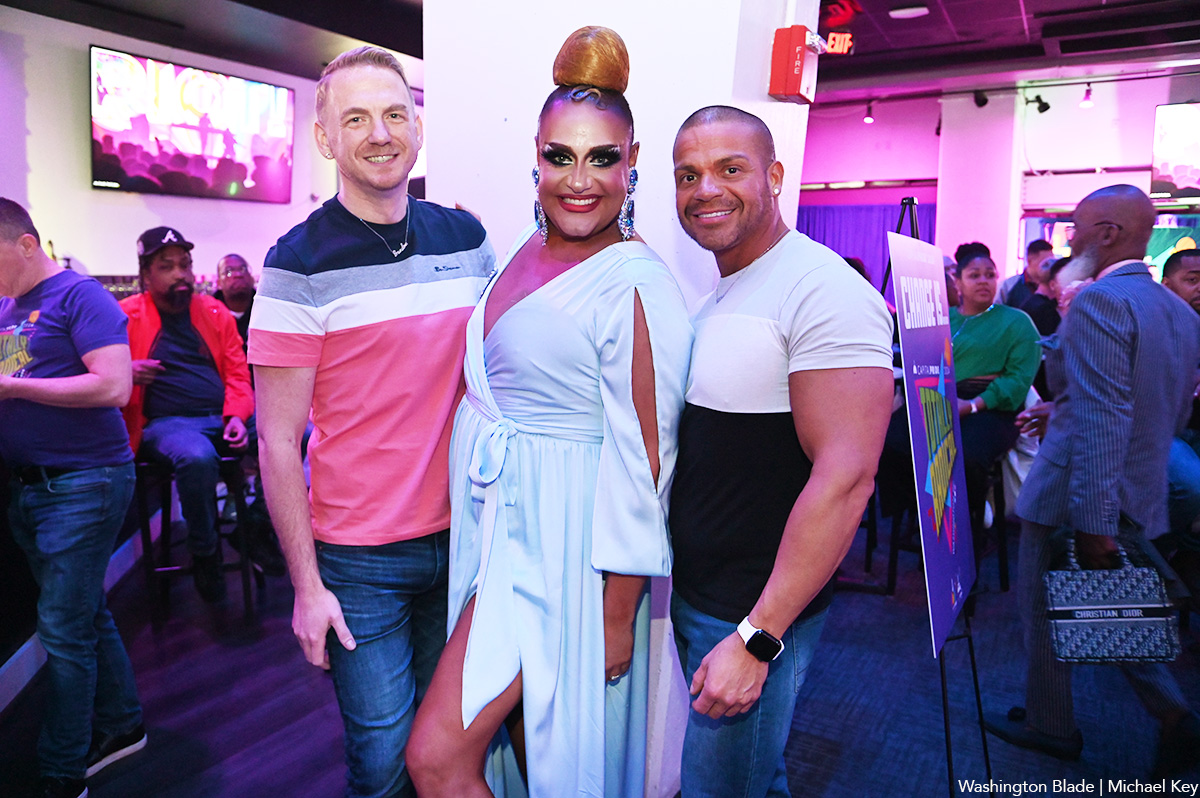
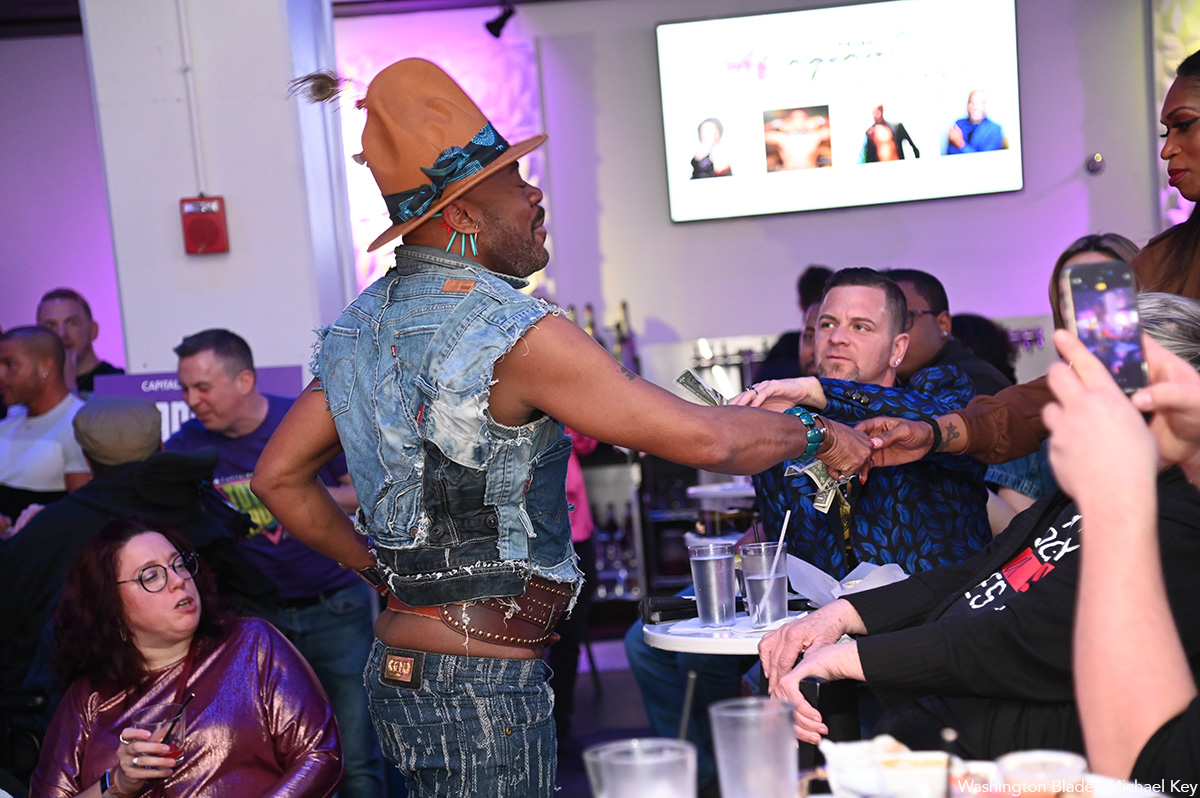
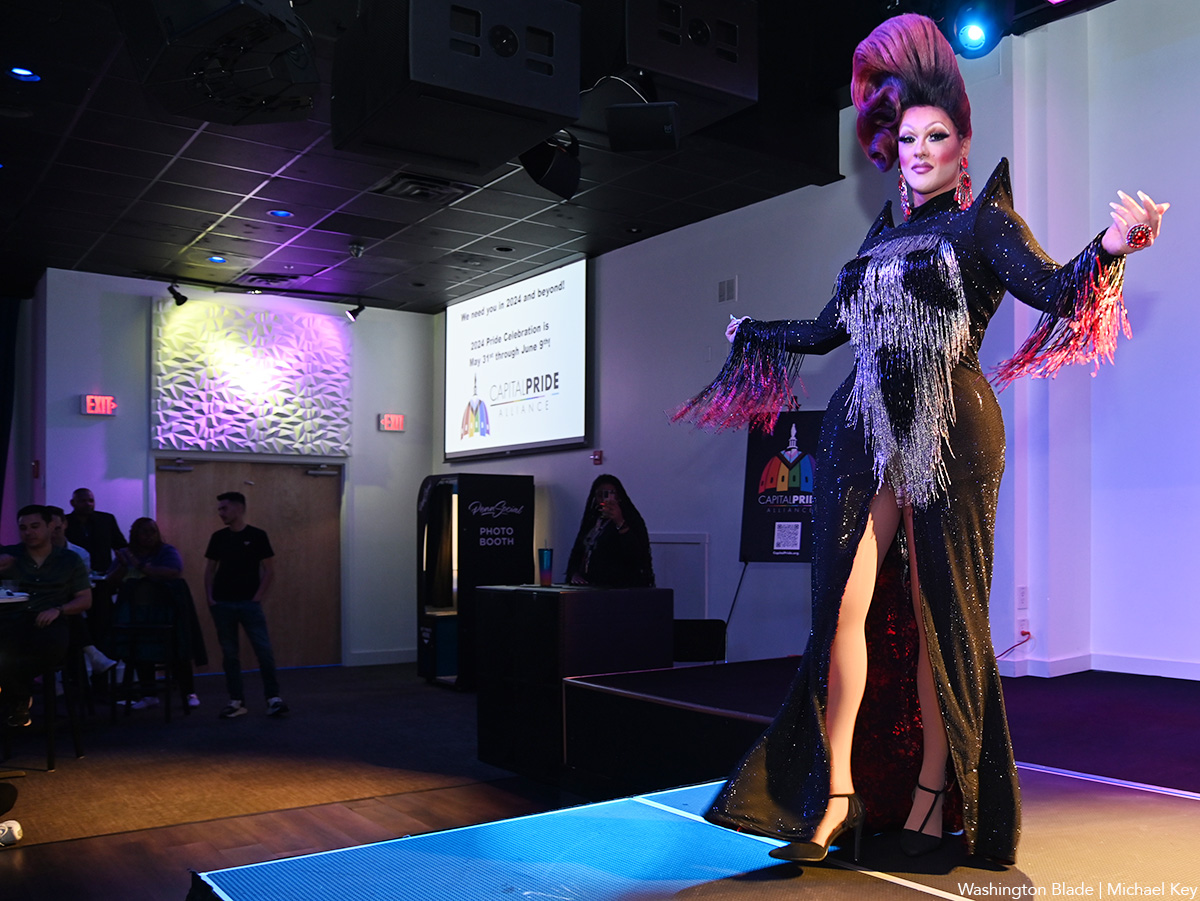
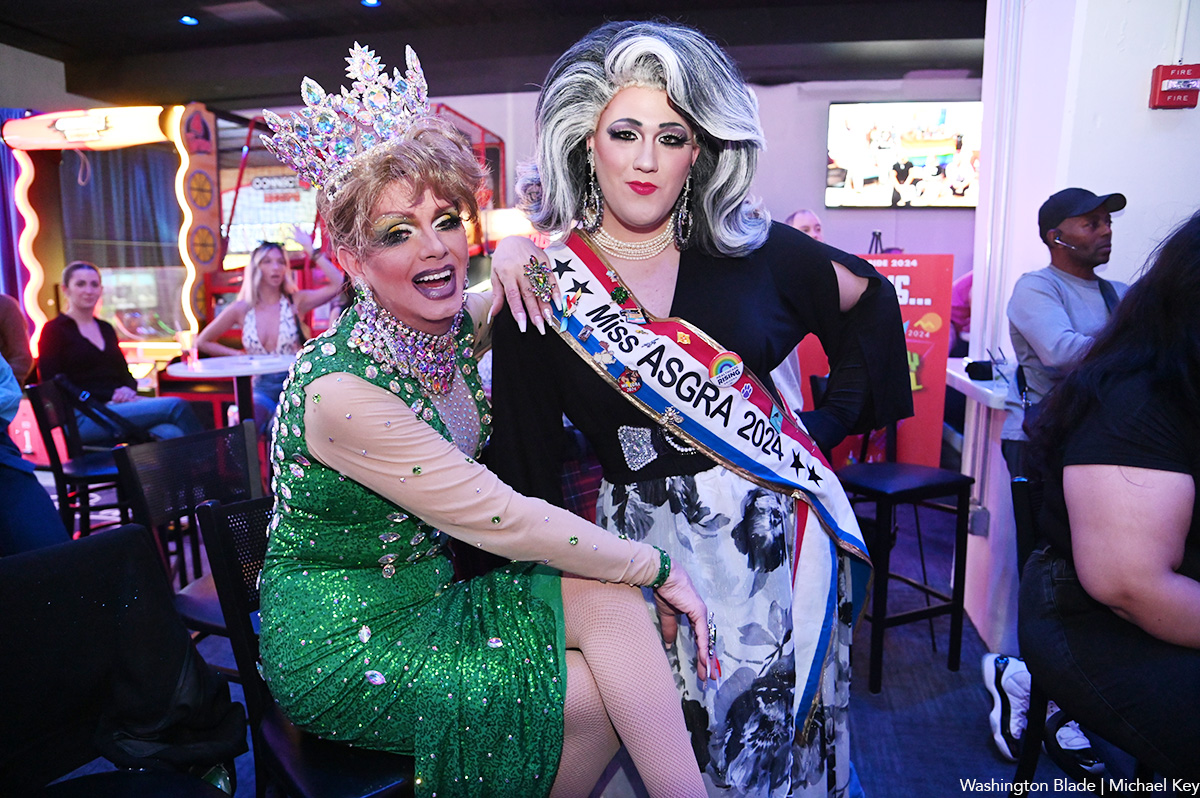
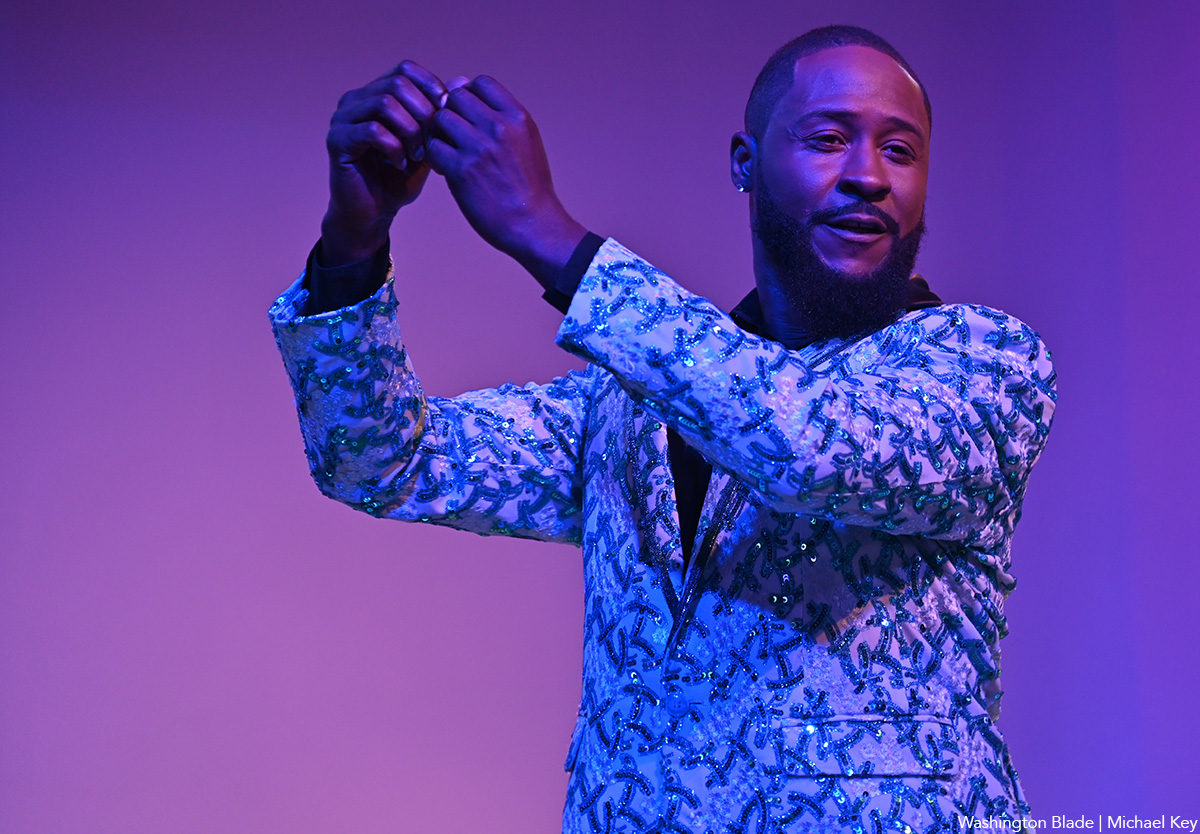
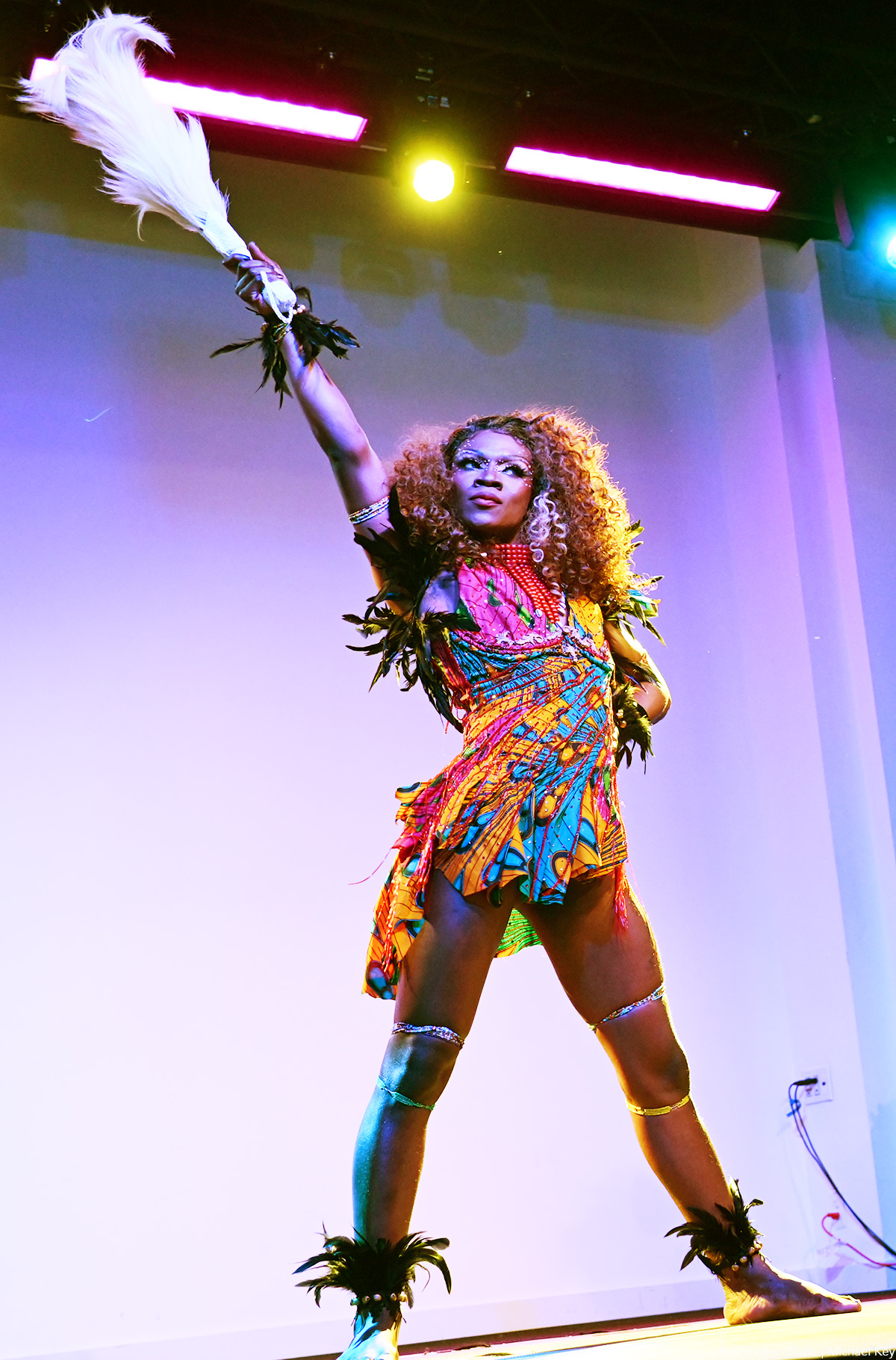
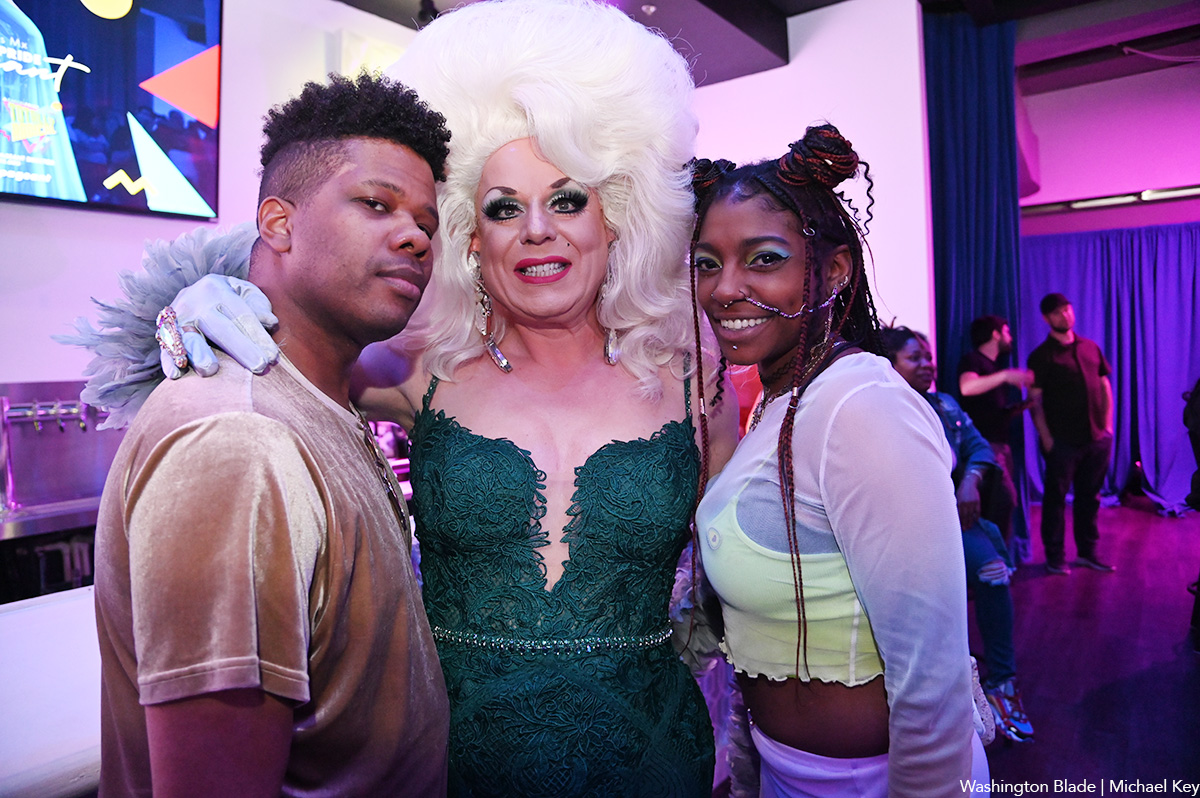
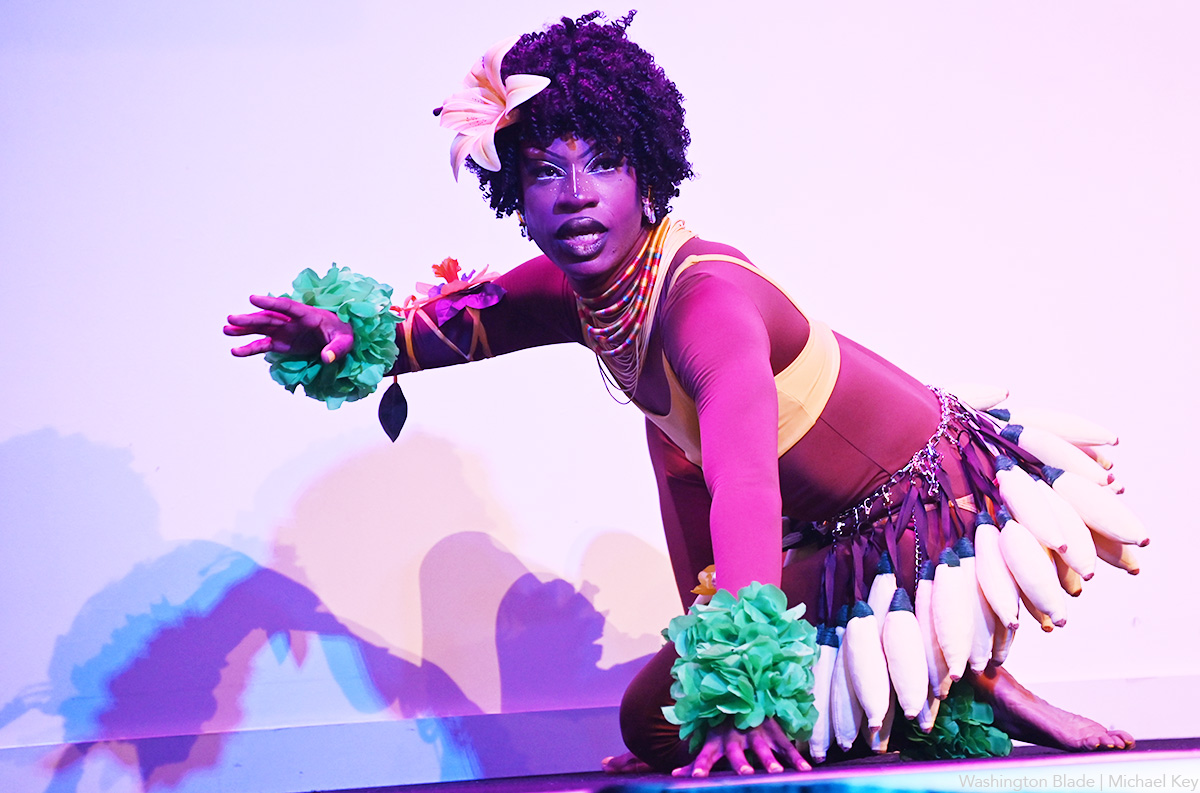
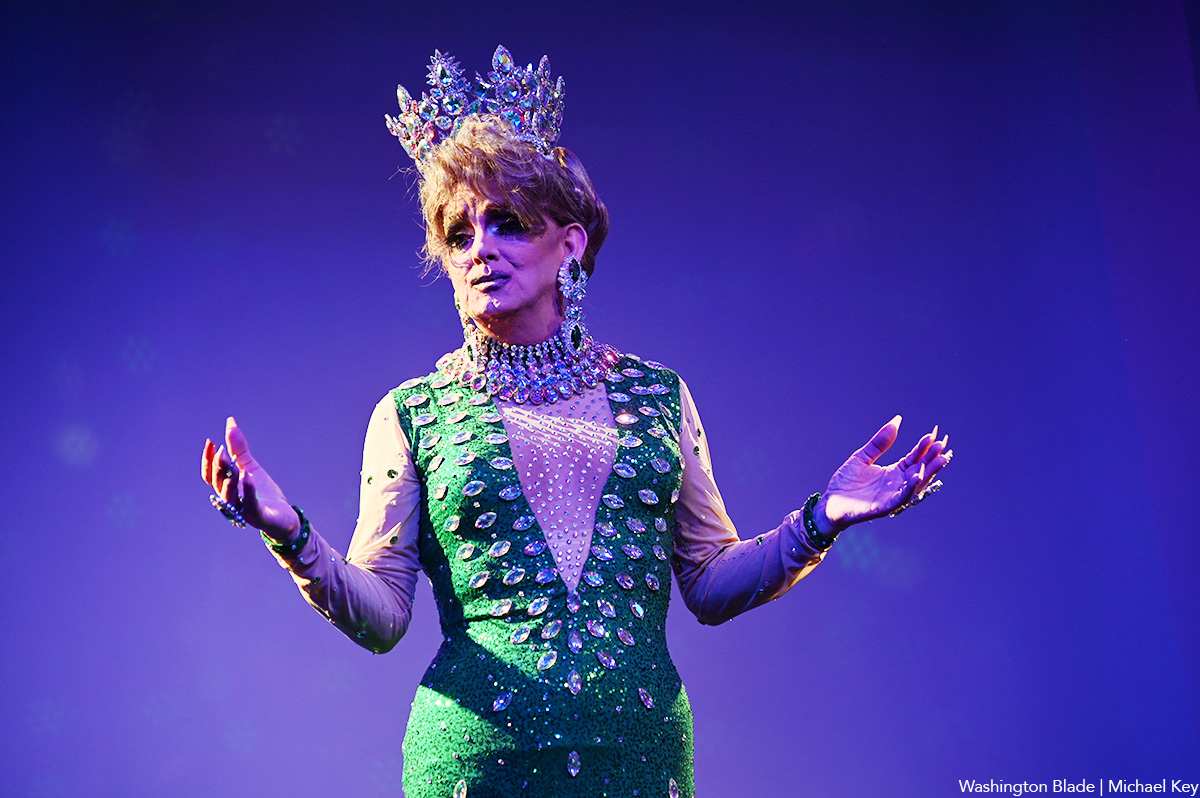
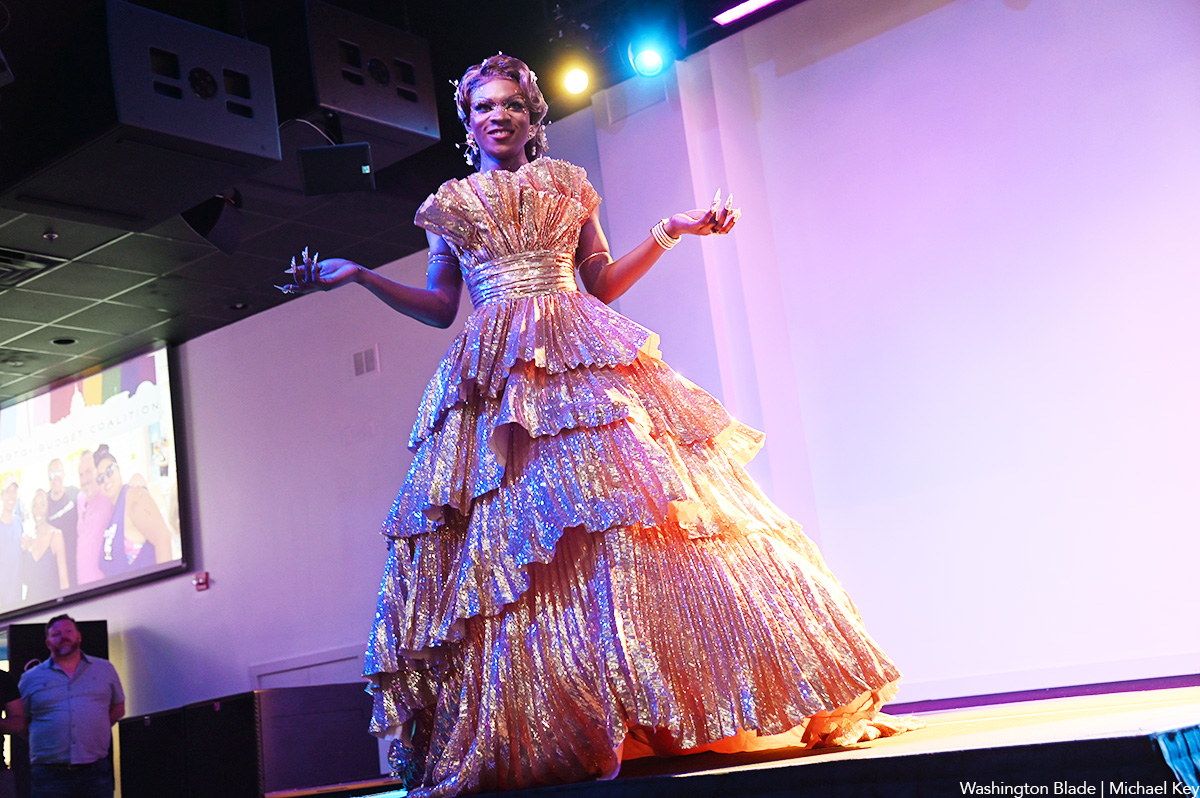
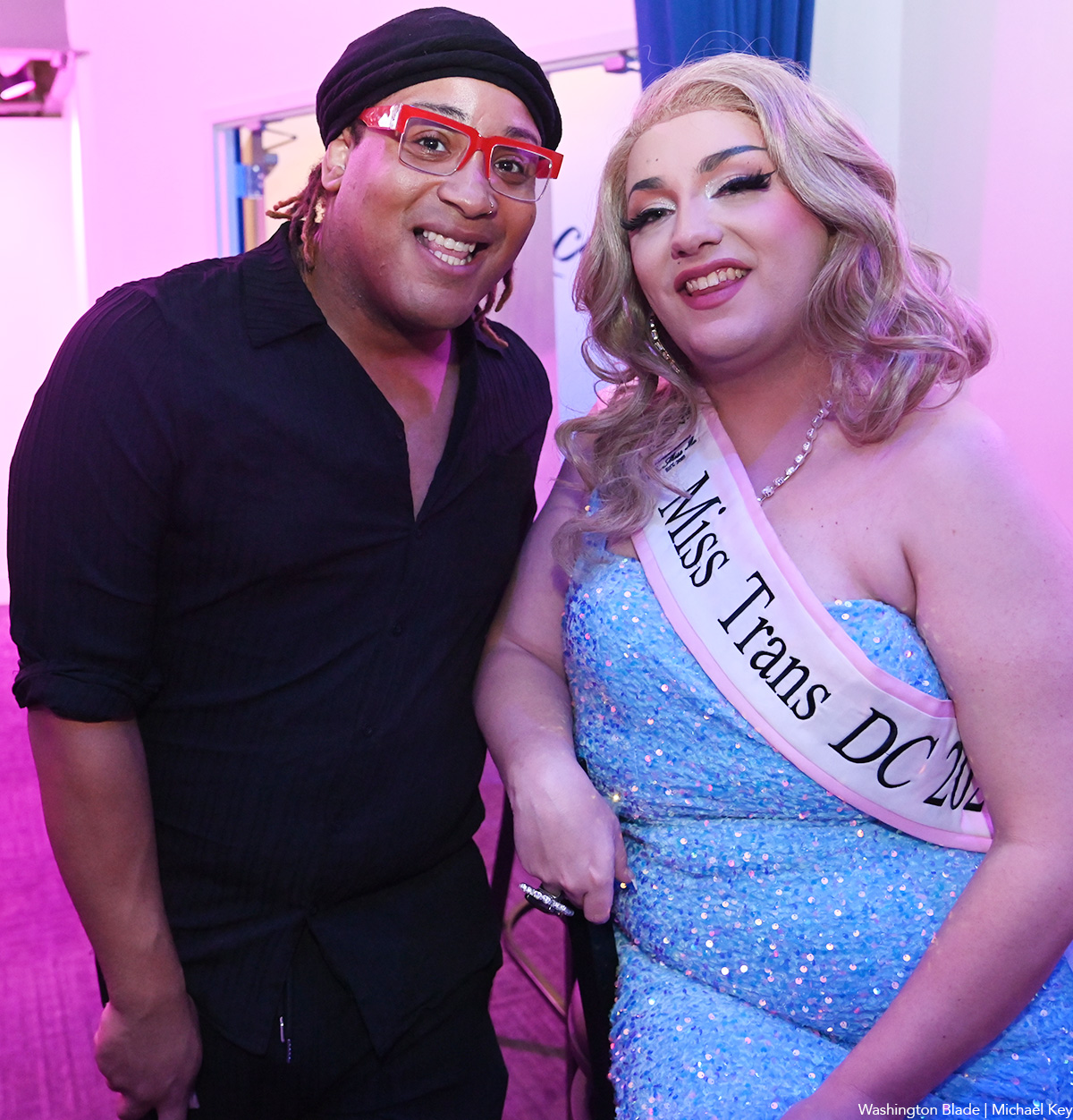
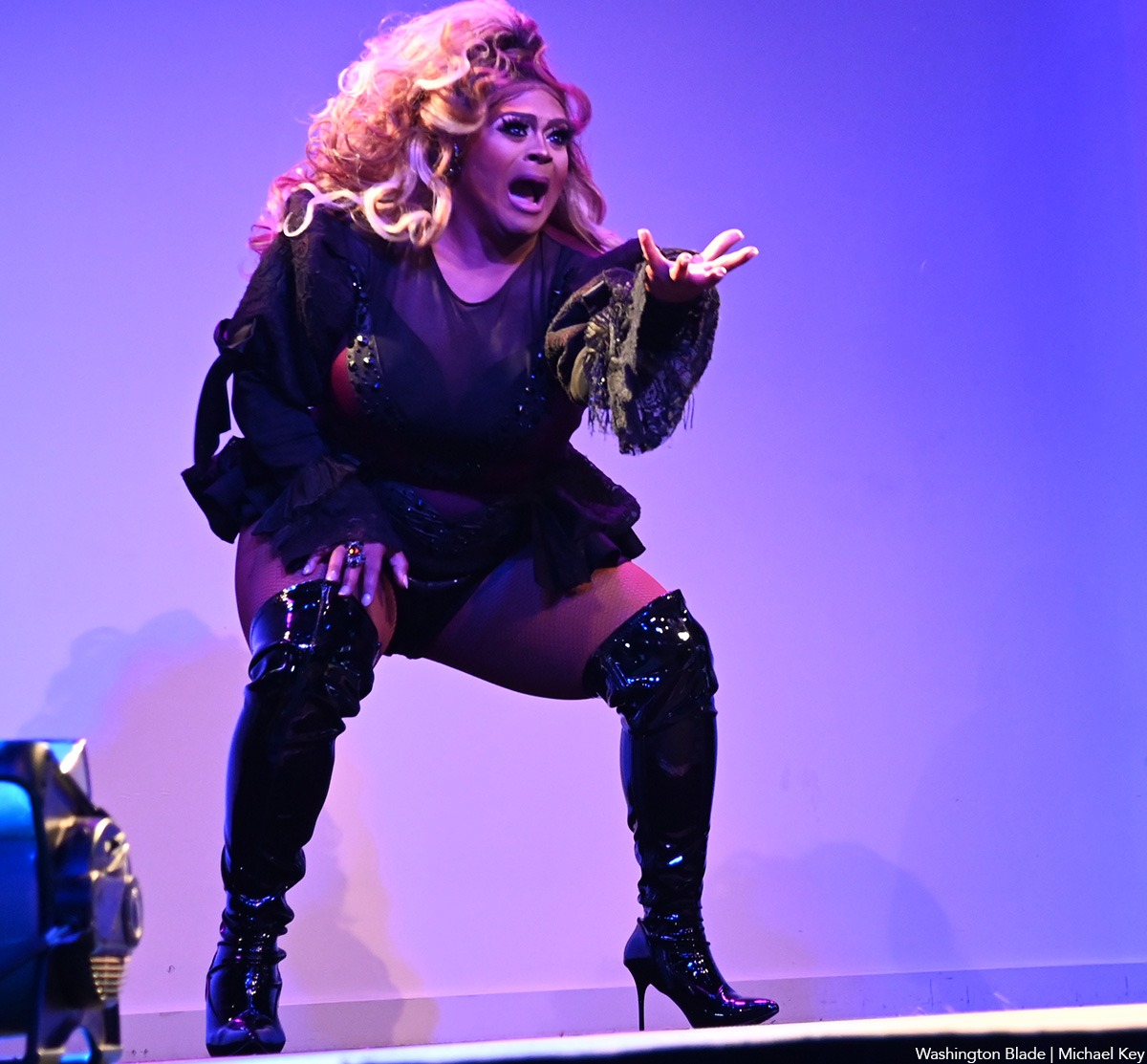
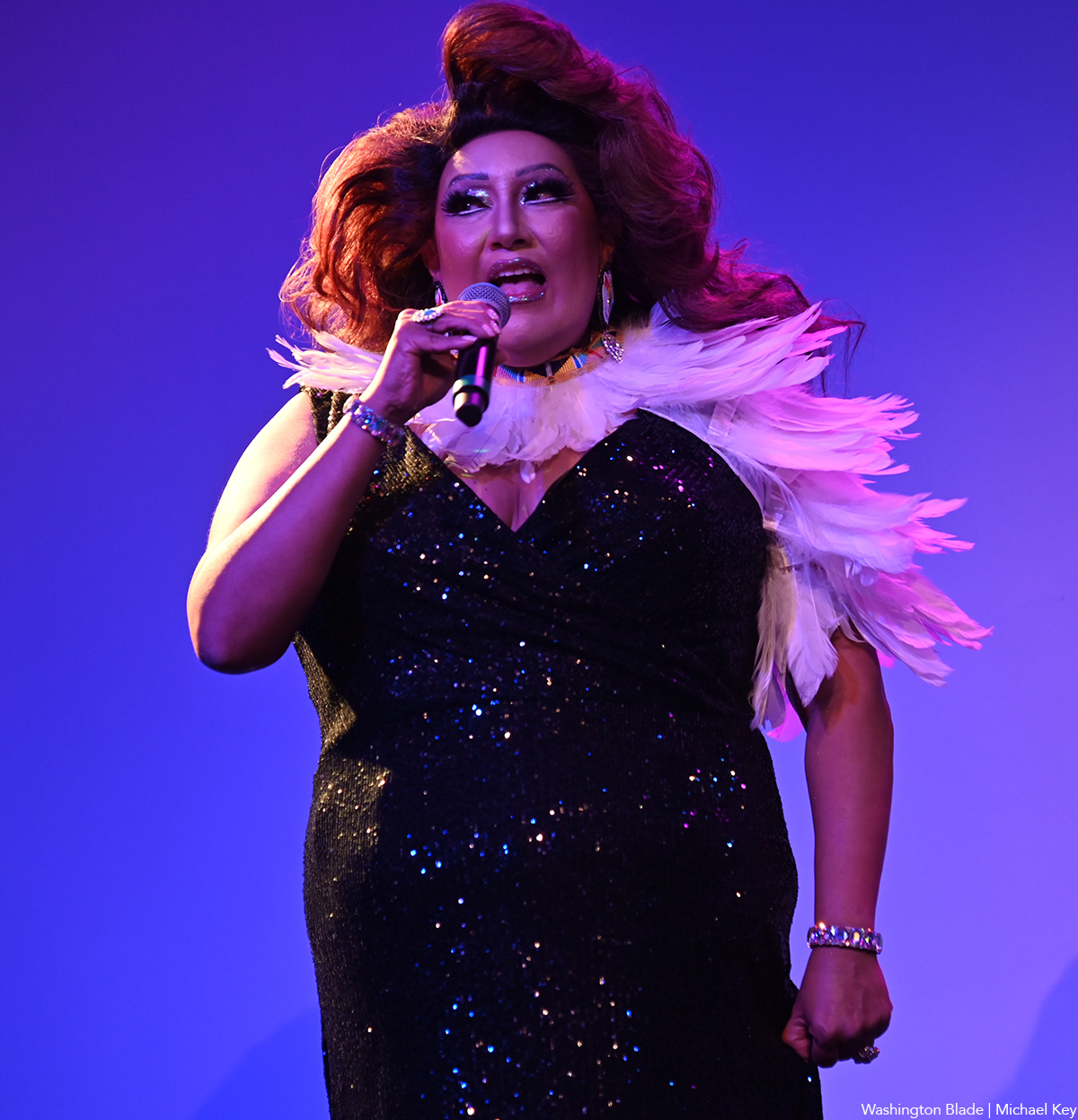
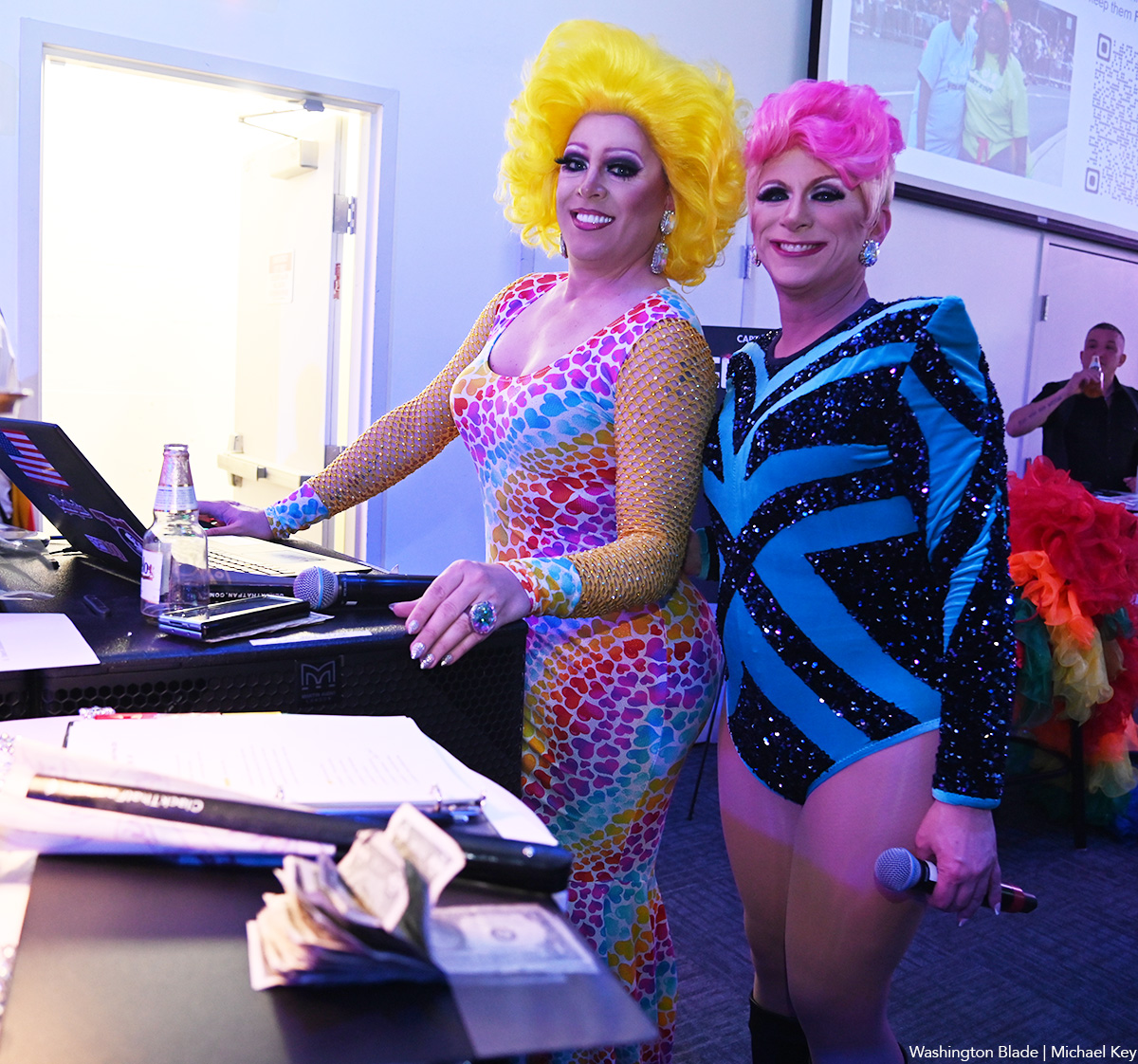
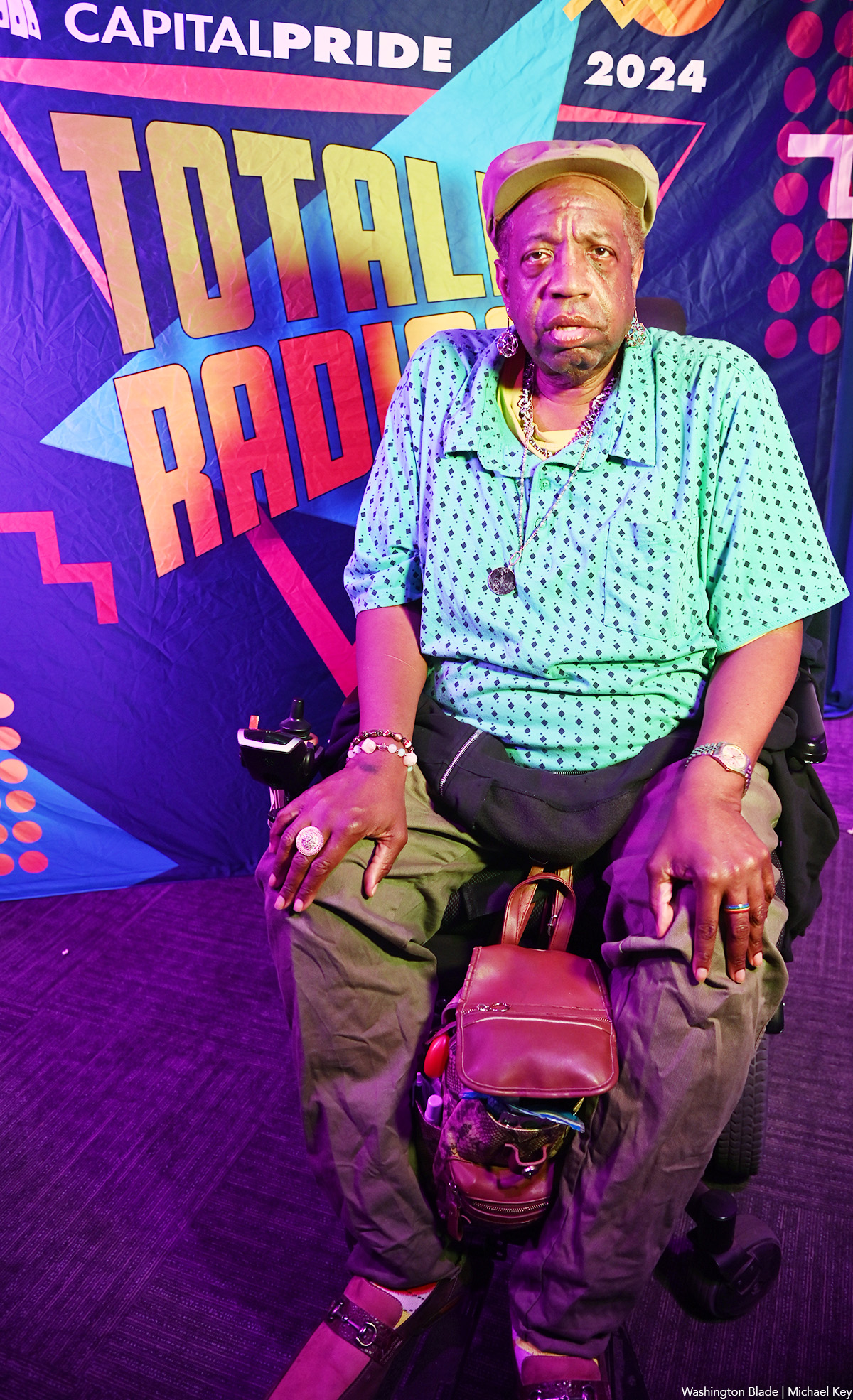
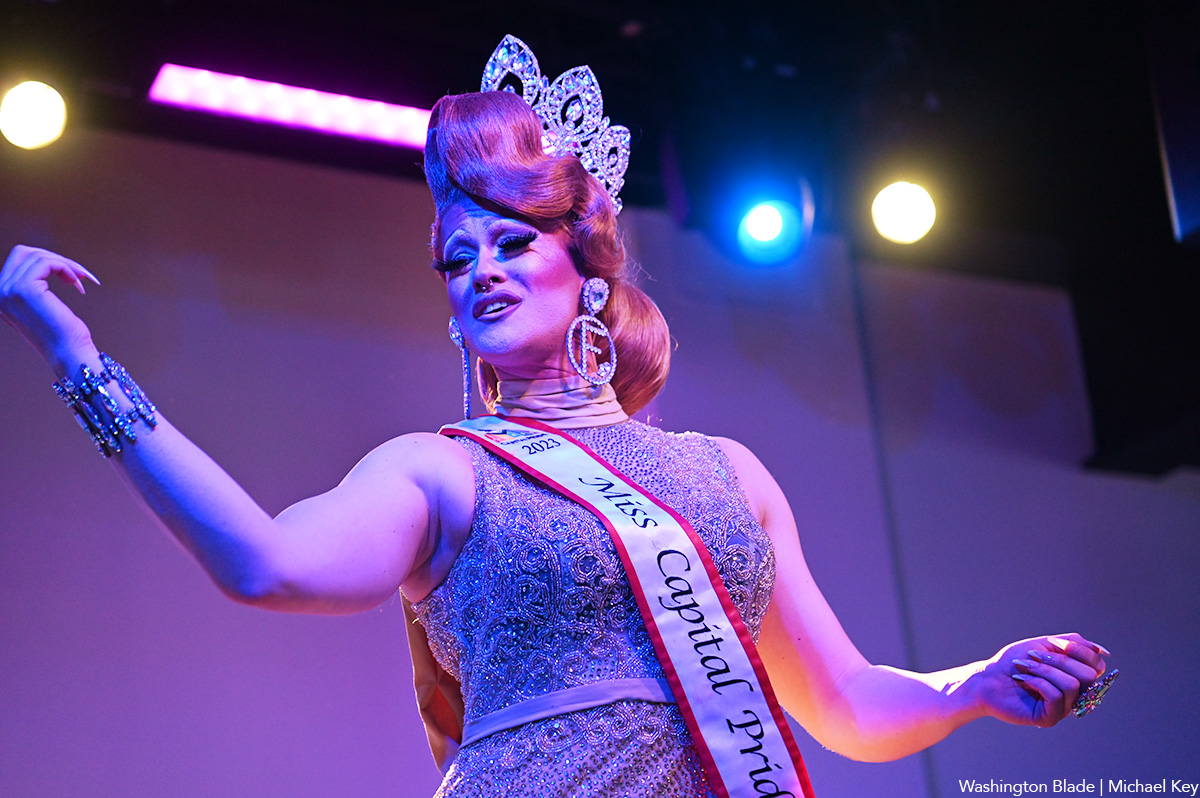
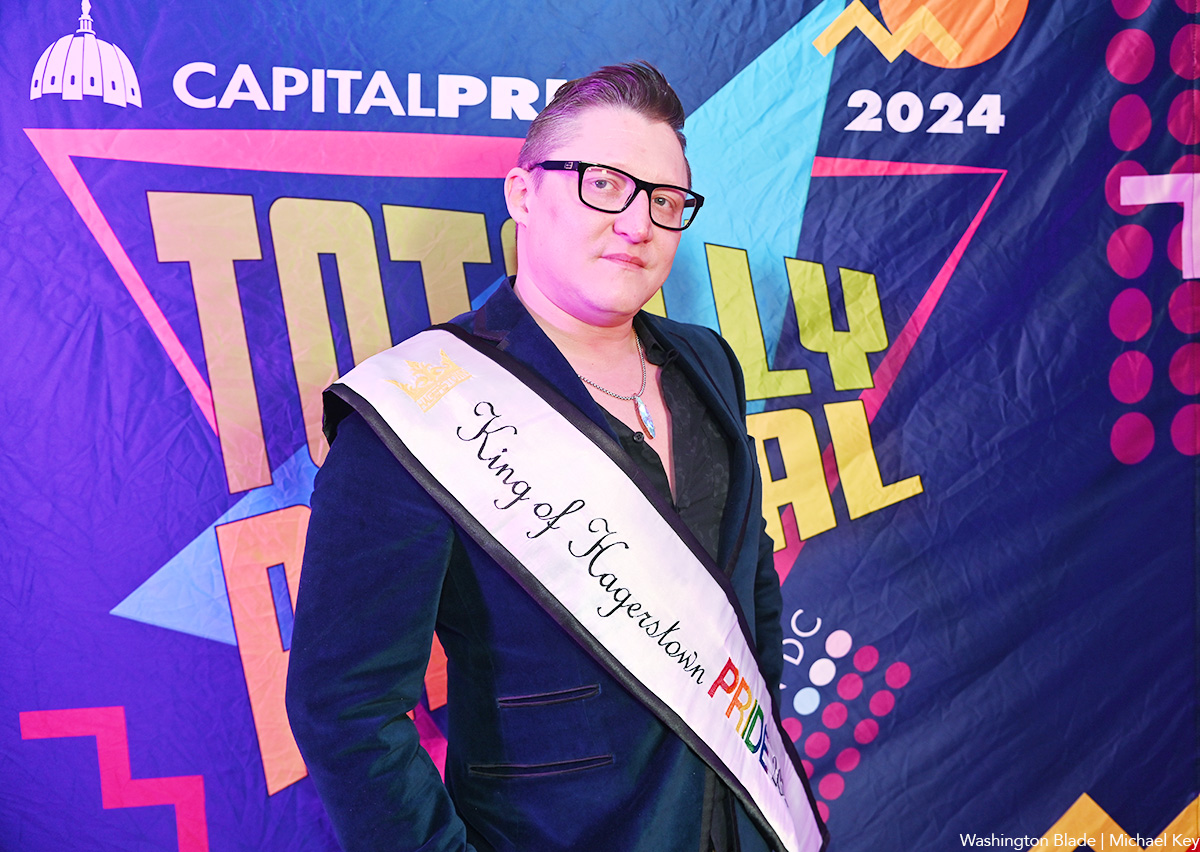
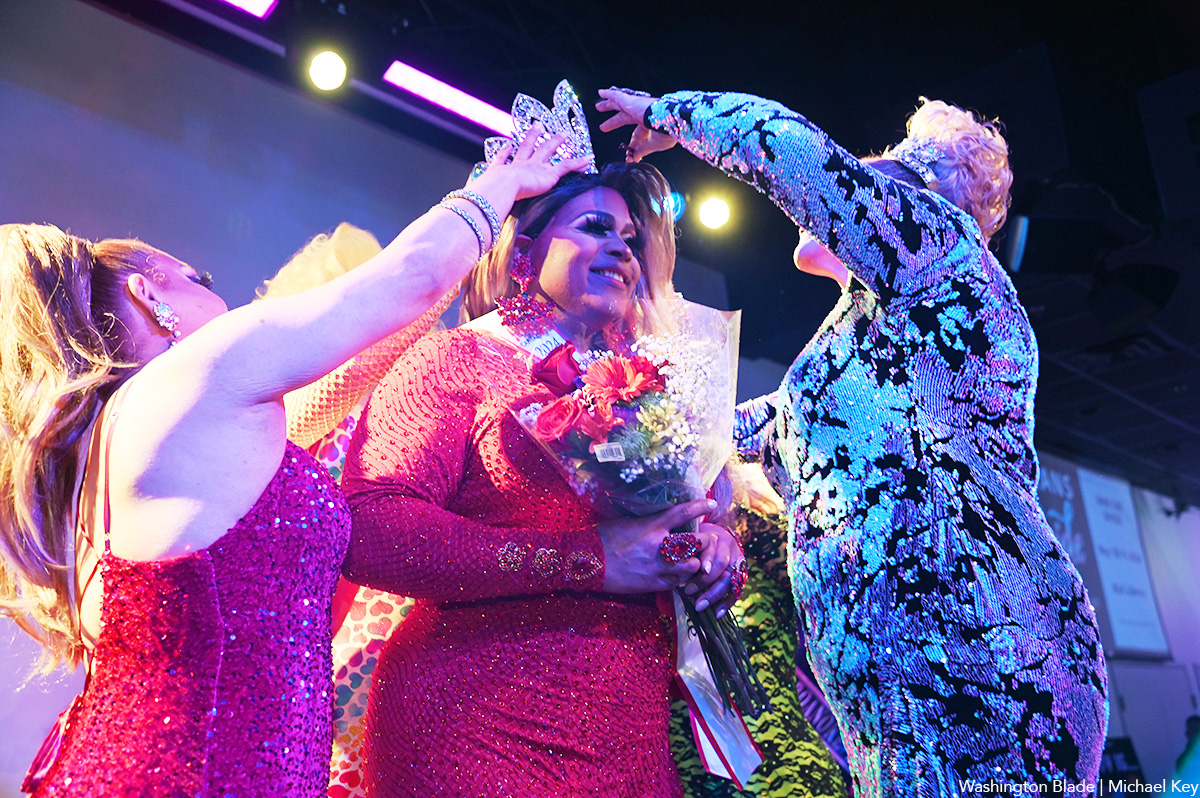
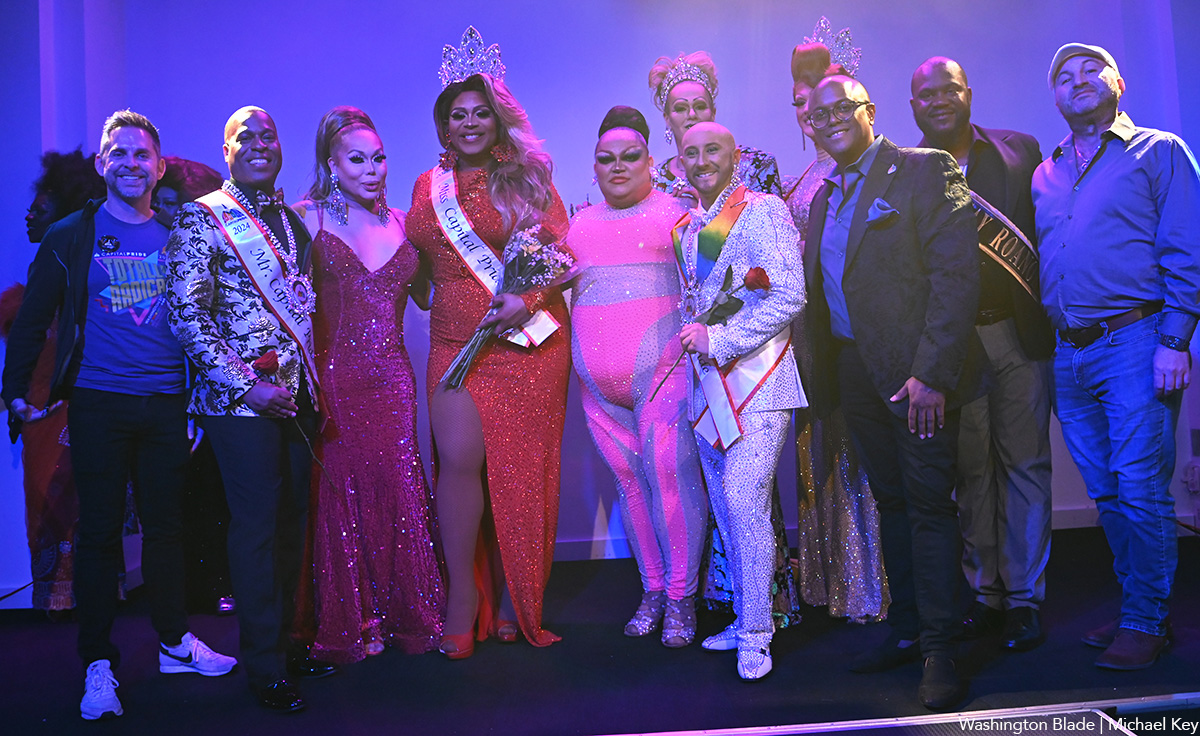
Theater
Round House explores serious issues related to privilege
‘A Jumping-Off Point’ is absorbing, timely, and funny
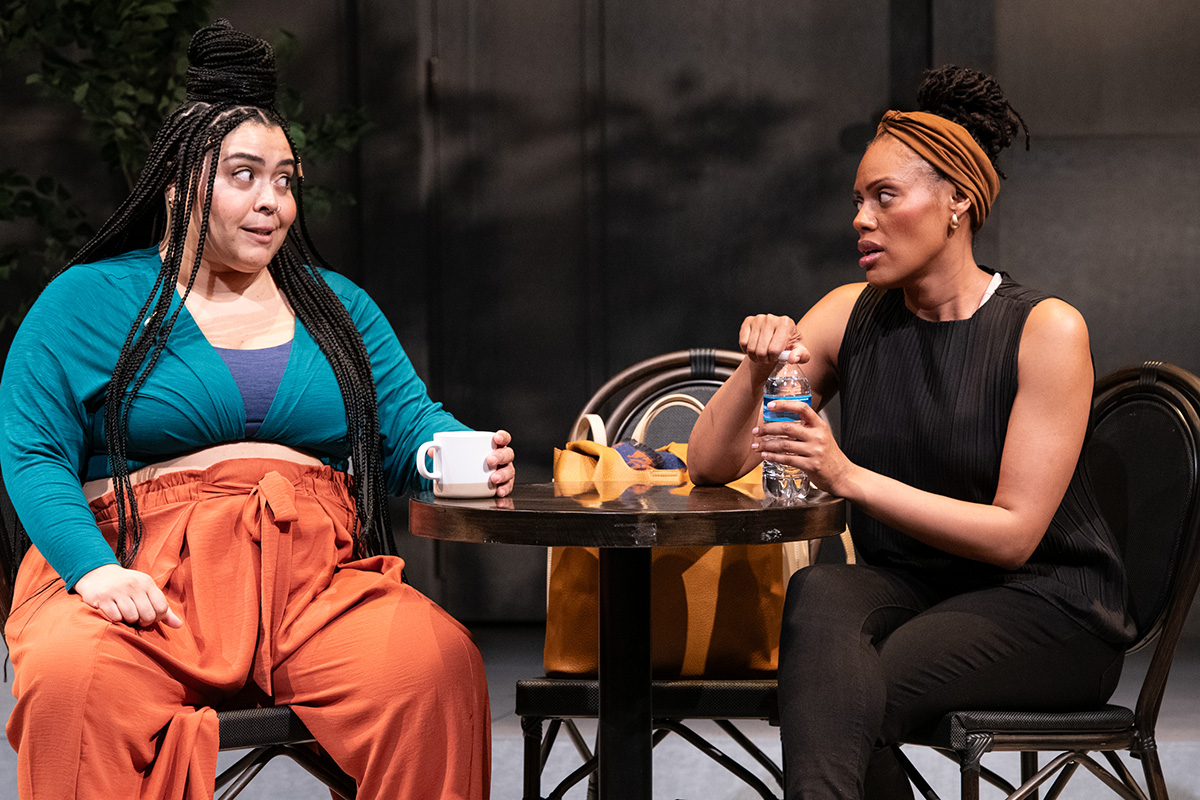
‘A Jumping-Off Point’
Through May 5
Round House Theatre
4545 East-West Highway, Bethesda, Md.
$46-$83
Roundhousetheatre.org
In Inda Craig-Galván’s new play “A Jumping-Off Point,” protagonist Leslie Wallace, a rising Black dramatist, believes strongly in writing about what you know. Clearly, Craig-Galván, a real-life successful Black playwright and television writer, adheres to the same maxim. Whether further details from the play are drawn from her life, is up for speculation.
Absorbing, timely, and often funny, the current Round House Theatre offering explores some serious issues surrounding privilege and who gets to write about what. Nimbly staged and acted by a pitch perfect cast, the play moves swiftly across what feels like familiar territory without being the least bit predictable.
After a tense wait, Leslie (Nikkole Salter) learns she’s been hired to be showrunner and head writer for a new HBO MAX prestige series. What ought to be a heady time for the ambitious young woman quickly goes sour when a white man bearing accusations shows up at her door.
The uninvited visitor is Andrew (Danny Gavigan), a fellow student from Leslie’s graduate playwriting program. The pair were never friends. In fact, he pressed all of her buttons without even trying. She views him as a lazy, advantaged guy destined to fail up, and finds his choosing to dramatize the African American Mississippi Delta experience especially annoying.
Since grad school, Leslie has had a play successfully produced in New York and now she’s on the cusp of making it big in Los Angeles while Andrew is bagging groceries at Ralph’s. (In fact, we’ll discover that he’s a held a series of wide-ranging temporary jobs, picking up a lot of information from each, a habit that will serve him later on, but I digress.)
Their conversation is awkward as Andrew’s demeanor shifts back and forth from stiltedly polite to borderline threatening. Eventually, he makes his point: Andrew claims that Leslie’s current success is entirely built on her having plagiarized his script.
This increasingly uncomfortable set-to is interrupted by Leslie’s wisecracking best friend and roommate Miriam who has a knack for making things worse before making them better. Deliciously played by Cristina Pitter (whose program bio describes them as “a queer multi-spirit Afro-indigenous artist, abolitionist, and alchemist”), Miriam is the perfect third character in Craig-Galván’s deftly balanced three-hander.
Cast members’ performances are layered. Salter’s Leslie is all charm, practicality, and controlled ambition, and Gavigan’s Andrew is an organic amalgam of vulnerable, goofy, and menacing. He’s terrific.
The 90-minute dramedy isn’t without some improbable narrative turns, but fortunately they lead to some interesting places where provoking questions are representation, entitlement, what constitutes plagiarism, etc. It’s all discussion-worthy topics, here pleasingly tempered with humor.
New York-based director Jade King Carroll skillfully helms the production. Scenes transition smoothly in large part due to a top-notch design team. Scenic designer Meghan Raham’s revolving set seamlessly goes from Leslie’s attractive apartment to smart cafes to an HBO writers’ room with the requisite long table and essential white board. Adding to the graceful storytelling are sound and lighting design by Michael Keck and Amith Chandrashaker, respectively.
The passage of time and circumstances are perceptively reflected in costume designer Moyenda Kulemeka’s sartorial choices: heels rise higher, baseball caps are doffed and jackets donned.
“A Jumping-Off Point” is the centerpiece of the third National Capital New Play Festival, an annual event celebrating new work by some of the country’s leading playwrights and newer voices.
Nightlife
Ed Bailey brings Secret Garden to Project GLOW festival
An LGBTQ-inclusive dance space at RFK this weekend

When does a garden GLOW? When it’s run by famed local gay DJ Ed Bailey.
This weekend, music festival Project GLOW at RFK Festival Grounds will feature Bailey’s brainchild the Secret Garden, a unique space just for the LGBTQ community that he launched in 2023.
While Project GLOW, running April 27-28, is a stage for massive electronic DJ sets in a large outdoor space, Secret Garden is more intimate, though no less adrenaline-forward. He’s bringing the nightclub to the festival. The garden is a dance area that complements the larger stages, but also stands on its own as a draw for festival-goers. Its focus is on DJs that have a presence and following in the LGBTQ audience world.
“The Secret Garden is a showcase for what LGBTQ nightlife, and nightclubs in general, are all about,” he says. “True club DJs playing club music for people that want to dance in a fun environment that is high energy and low stress. It’s the cool party inside the bigger party.”
Project GLOW launched in 2022. Bailey connected with the operators after the first event, and they discussed Bailey curating his own space for 2023. “They were very clear that they wanted me to lean into the vibrant LGBTQ nightlife of D.C. and allow that community to be very visibly a part of this area.”
Last year, club icon Kevin Aviance headlined the Secret Garden. The GLOW festival organizers loved the its energy from last year, and so asked Bailey to bring it back again, with an entire year to plan.
This year, Bailey says, he is “bringing in more D.C. nightlife legends.” Among those are DJ Sedrick, “a DJ and entertainer legend. He was a pivotal part of Tracks nightclub and is such a dynamic force of entertainment,” says Bailey. “I am excited for a whole new audience to be able to experience his very special brand of DJing!”
Also, this year brings in Illustrious Blacks, a worldwide DJ duo with roots in D.C.; and “house music legends” DJs Derrick Carter and DJ Spen.
Bailey is focusing on D.C.’s local talent, with a lineup including Diyanna Monet, Strikestone!, Dvonne, Baronhawk Poitier, THABLACKGOD, Get Face, Franxx, Baby Weight, and Flower Factory DJs KS, Joann Fabrixx, and PWRPUFF.
Secret Garden also brings in performers who meld music with dance, theater, and audience interactions for a multi-sensory experience.
Bailey is an owner of Trade and Number Nine, and was previously an owner of Town Danceboutique. Over the last 35 years, Bailey owned and operated more than 10 bars and clubs in D.C. He has an impressive resume, too. Since starting in 1987, he’s DJ’d across the world for parties and nightclubs large and intimate. He says that he opened “in concert for Kylie Minogue, DJed with Junior Vasquez, played giant 10,000-person events, and small underground parties.” He’s also held residencies at clubs in Atlanta, Miami, and here in D.C. at Tracks, Nation, and Town.
With Secret Garden, Bailey and GLOW aim to bring queer performers into the space not just for LGBTQ audiences, but for the entire music community to meet, learn about, and enjoy. While they might enjoy fandom among queer nightlife, this Garden is a platform for them to meet the entirety of GLOW festival goers.
Weekend-long Project GLOW brings in headliners and artists from EDM and electronic music, with big names like ILLENIUM, Zedd, and Rezz. In all, more than 50 artists will take the three stages at the third edition of Project GLOW, presented by Insomniac (Electric Daisy Carnival) and Club Glow (Echostage, Soundcheck).
-

 District of Columbia3 days ago
District of Columbia3 days agoCatching up with the asexuals and aromantics of D.C.
-

 South America3 days ago
South America3 days agoArgentina government dismisses transgender public sector employees
-

 Maine4 days ago
Maine4 days agoMaine governor signs transgender, abortion sanctuary bill into law
-

 District of Columbia4 days ago
District of Columbia4 days agoBowser budget proposal calls for $5.25 million for 2025 World Pride


